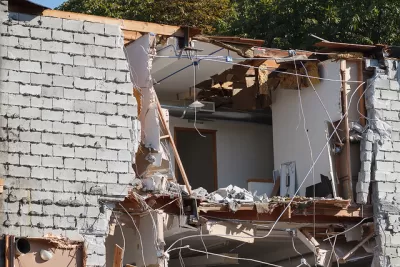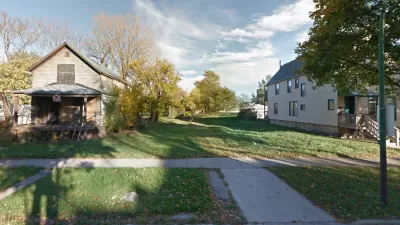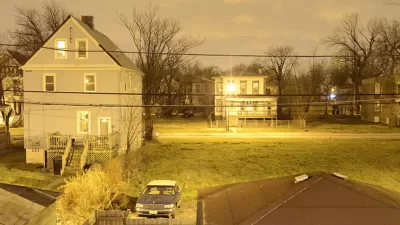There's a rationale for the demolition of vacant properties in cities like Chicago, but does that mean the city should be celebrating these programs? The planning of shrinking cities, it turns out, is still very much a work in progress.

An article by Chris Hagan tackles some of the troubling aspects of demolition programs in the city of Chicago.
First there's the question of whether the city's many demolition programs, resulting in the demolition of 3,100 buildings since 2008, are laying a foundation for neighborhood revitalization. In areas where private developers are pulling demolition permits, redevelopment often follows. The same potential for redevelopment isn't present when the city demolishes buildings, according to Hagan.
The article focuses on the varying goals and results of the city's approach to vacant lots and city-owned properties. Despite efforts to intervene with troubled buildings and properties (examples include the Large Lots Program, the Troubled Building Initiative, and a forfeiture program for vacant buildings) the city currently owns about 15,000 vacant lots, according to Hagan.
Thus, the question of how residents should feel about buildings being torn down in the neighborhoods. Pubic officials are ready to laud demolition programs as a win for public safety and redevelopment. The article opens with an anecdote about a press conference "kicking off the latest city initiative to tear down vacant buildings in high-crime police districts," which included a "group of Chicago city officials — including now-Chicago Police Superintendent Eddie Johnson" speaking into a "an official City of Chicago podium with microphones jutting out the top."
So should the city be celebrating when it tears down another building, or its 100th building, or any building—especially when it doesn't always have a plan for what comes next?
FULL STORY: Should Chicago Be Celebrating Demolitions?

Alabama: Trump Terminates Settlements for Black Communities Harmed By Raw Sewage
Trump deemed the landmark civil rights agreement “illegal DEI and environmental justice policy.”

Planetizen Federal Action Tracker
A weekly monitor of how Trump’s orders and actions are impacting planners and planning in America.

Why Should We Subsidize Public Transportation?
Many public transit agencies face financial stress due to rising costs, declining fare revenue, and declining subsidies. Transit advocates must provide a strong business case for increasing public transit funding.

How Housing as a Financial Product Harms Communities
Institutional buyers who treat housing as an investment product become disconnected from the impacts of higher rents, displacement, and housing instability.

Blinded by the Light: When Brighter Headlights Decrease Safety
Bright LED headlights can create glare and reduce visibility for other drivers and pedestrians.

Study Links Covid and Poor Driving
The effects of the virus, including ‘brain fog,’ can make driving more difficult and dangerous.
Urban Design for Planners 1: Software Tools
This six-course series explores essential urban design concepts using open source software and equips planners with the tools they need to participate fully in the urban design process.
Planning for Universal Design
Learn the tools for implementing Universal Design in planning regulations.
Caltrans
Smith Gee Studio
Institute for Housing and Urban Development Studies (IHS)
City of Grandview
Harvard GSD Executive Education
Toledo-Lucas County Plan Commissions
Salt Lake City
NYU Wagner Graduate School of Public Service




























